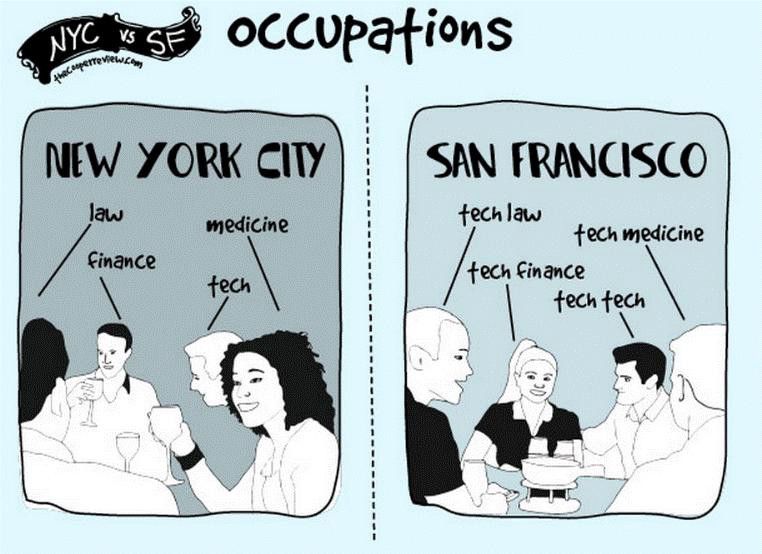Why We Moved our Company from SF to NYC

Stringr was founded in San Francisco. The founding team met while gazing at a gleaming view of the Bay Bridge at Wharton|SF on the Embarcadero. I own a condo in Russian Hill.
One of my co-founders, Lindsay Stewart, was raised in Silicon Valley and went to undergrad at Berkeley, her father an entrepreneur, tech exec and earned two engineering degrees from Stanford.
Silicon Valley/San Francisco is the undisputed capital of startups. And yet, while thousands of entrepreneurs from across the world pack their bags, say goodbye to their families and move to the Bay Area to start a company. We said ciao.
Was it the cost? Nope, we moved to the one place in the US more expensive, New York City.
Was it a bout of temporary insanity? After surviving our first winter in New York, I’m inclined to think maybe… but I don’t think that’s it either.
A lifelong love of Sinatra’s New York, New York? I’m guilty of that love… but that’s not the reason either.
We moved because of clusters.
Clustering, the existence of many companies within one industry all in the same place makes sense — and happens a lot.
Think of just about any industry, and chances are there is some city or region that springs to mind. Cars? Detroit. Aerospace? Seattle. Pharmaceuticals? NY/NJ. Movies? Hollywood.
You get the point.
By clustering near each other companies gain easy access to knowledge, employees, customers, and suppliers. It’s easier to hire employees with expertise in your industry. Meetings with key suppliers or customers can occur with greater frequency. The network effect begins to set in which elevates the value of all the players.
Starting a start-up in the start-up capital makes a fair degree of sense. After all, early stage companies face similar challenges — how to attract co-founders and initial employees, structure a convertible note, build an MVP, determine which technology stack to use, which CRM solution to implement, even mundane things like whether to use Slack or email, are made easier and better by the consensus of intelligent crowd of entrepreneurs who are doing the same thing.
Yet, these shared experiences quickly fade as your start-up goes into puberty. And the next important decisions become far more solution specific: questions of pricing, marketing and sequencing of product development take precedence.
Most importantly, you need not just talent but specific talent: Great product, sales and marketing people who understand, and have worked in your industry — for a while, perhaps even a long while.
I can hear you thinking “what about tech companies… The Bay Area is the capital of tech!” But here’s a hard truth. If you are a startup get ready to looking in the mirror and realize that maybe, just maybe you aren’t REALLY a tech company. You’re a tech enabled company innovating within an existing industry. This comic by Sarah Cooper that made the rounds a bit ago describes this acutely.

But let’s face it… there is no such thing as Fin-tech, it’s Finance. Ad-tech? Advertising. Ford was not founded in the transport-tech business, AT&T was not communications-tech. The use of technology is simply a means to optimize. A capital versus labor trade-off.
So if you are starting a finance or advertising company enabled by tech — I encourage you to go find your people — and they may not be in the City by The Bay.
I understand there is a trepidation about investors: If I move from the Bay Area, they will not come.
You know what investors like? Customers.
Customers are awesome because they are those people who write checks without taking a stake in your company. They give you feedback, they pay you for your services, they are the reason your company exists. That’s what they call a product market fit, not a product investor fit.
The company I co-founded, Stringr, is a video market place that allows customers to source custom content, under really tight deadlines — we sell to TV, Newspapers, Magazines. And so, Stringr moved to Big Apple, the capital of media (and conveniently also the capital of advertising — our 2nd market).
Would it be nice to have Sand Hill road down the street? Sure.
Enjoy the comparatively cheap rents? Yep.
Temperate climate… you betcha.
But Stringr needed to be in its cluster. In NYC, we’re down the street from talent who knows media inside and out, customers and business partners.
Silicon Valley is great. Don’t get me wrong. But you should always build your company for the long-run, and that includes your choice of location.
People. Go find your People.

